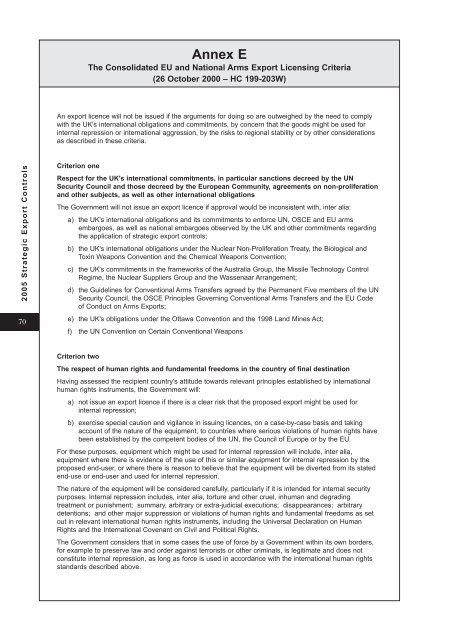Annex A - Official Documents
Annex A - Official Documents
Annex A - Official Documents
Create successful ePaper yourself
Turn your PDF publications into a flip-book with our unique Google optimized e-Paper software.
2005 Strategic Export Controls<br />
70<br />
<strong>Annex</strong> E<br />
The Consolidated EU and National Arms Export Licensing Criteria<br />
(26 October 2000 – HC 199-203W)<br />
An export licence will not be issued if the arguments for doing so are outweighed by the need to comply<br />
with the UK's international obligations and commitments, by concern that the goods might be used for<br />
internal repression or international aggression, by the risks to regional stability or by other considerations<br />
as described in these criteria.<br />
Criterion one<br />
Respect for the UK's international commitments, in particular sanctions decreed by the UN<br />
Security Council and those decreed by the European Community, agreements on non-proliferation<br />
and other subjects, as well as other international obligations<br />
The Government will not issue an export licence if approval would be inconsistent with, inter alia:<br />
a) the UK's international obligations and its commitments to enforce UN, OSCE and EU arms<br />
embargoes, as well as national embargoes observed by the UK and other commitments regarding<br />
the application of strategic export controls;<br />
b) the UK's international obligations under the Nuclear Non-Proliferation Treaty, the Biological and<br />
Toxin Weapons Convention and the Chemical Weapons Convention;<br />
c) the UK's commitments in the frameworks of the Australia Group, the Missile Technology Control<br />
Regime, the Nuclear Suppliers Group and the Wassenaar Arrangement;<br />
d) the Guidelines for Conventional Arms Transfers agreed by the Permanent Five members of the UN<br />
Security Council, the OSCE Principles Governing Conventional Arms Transfers and the EU Code<br />
of Conduct on Arms Exports;<br />
e) the UK's obligations under the Ottawa Convention and the 1998 Land Mines Act;<br />
f) the UN Convention on Certain Conventional Weapons<br />
Criterion two<br />
The respect of human rights and fundamental freedoms in the country of final destination<br />
Having assessed the recipient country's attitude towards relevant principles established by international<br />
human rights instruments, the Government will:<br />
a) not issue an export licence if there is a clear risk that the proposed export might be used for<br />
internal repression;<br />
b) exercise special caution and vigilance in issuing licences, on a case-by-case basis and taking<br />
account of the nature of the equipment, to countries where serious violations of human rights have<br />
been established by the competent bodies of the UN, the Council of Europe or by the EU.<br />
For these purposes, equipment which might be used for internal repression will include, inter alia,<br />
equipment where there is evidence of the use of this or similar equipment for internal repression by the<br />
proposed end-user, or where there is reason to believe that the equipment will be diverted from its stated<br />
end-use or end-user and used for internal repression.<br />
The nature of the equipment will be considered carefully, particularly if it is intended for internal security<br />
purposes. Internal repression includes, inter alia, torture and other cruel, inhuman and degrading<br />
treatment or punishment; summary, arbitrary or extra-judicial executions; disappearances; arbitrary<br />
detentions; and other major suppression or violations of human rights and fundamental freedoms as set<br />
out in relevant international human rights instruments, including the Universal Declaration on Human<br />
Rights and the International Covenant on Civil and Political Rights.<br />
The Government considers that in some cases the use of force by a Government within its own borders,<br />
for example to preserve law and order against terrorists or other criminals, is legitimate and does not<br />
constitute internal repression, as long as force is used in accordance with the international human rights<br />
standards described above.

















